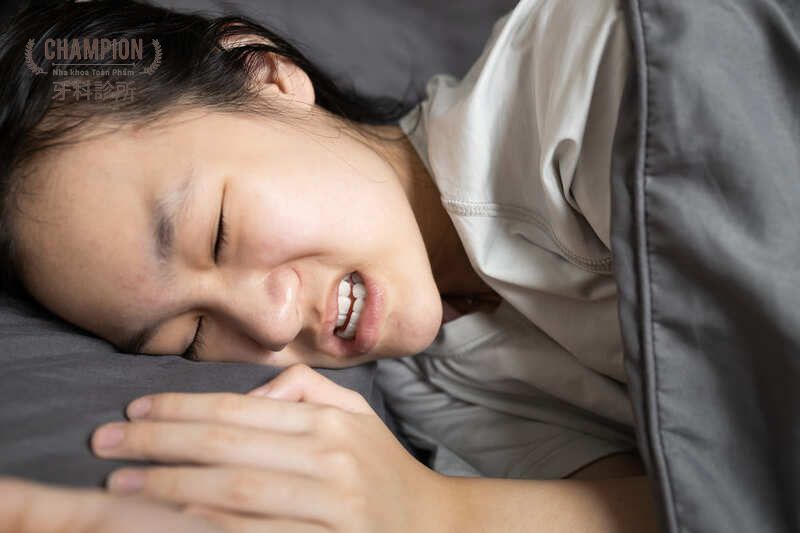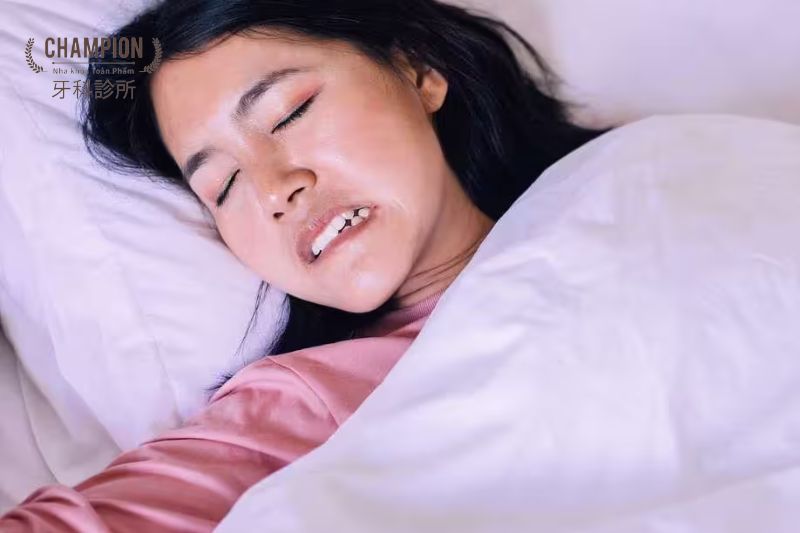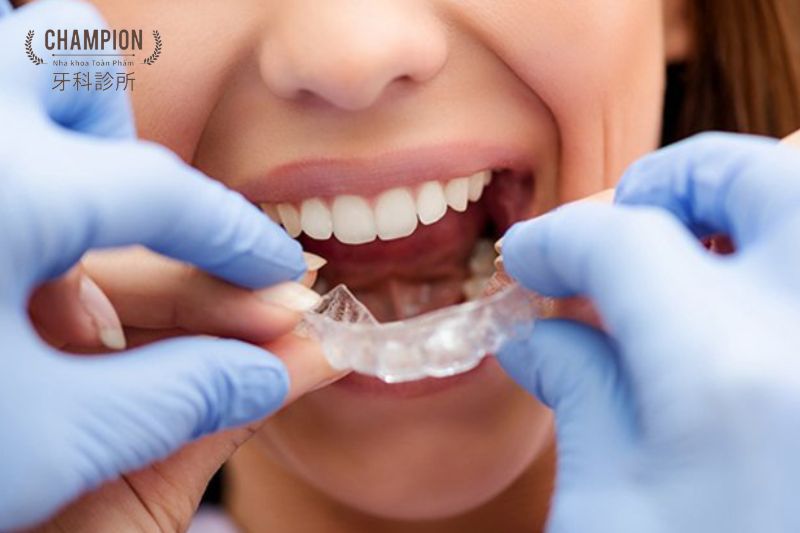Teeth grinding, also known as bruxism, is the unconscious habit of clenching or grinding teeth together, which can occur both during sleep (sleep bruxism) and while awake. The unpleasant grinding sound from the teeth rubbing against each other can disrupt your sleep and pose various risks to oral and overall health. Let's delve deeper into what teeth grinding is and the most effective ways to address it with Champion Dental Clinic.
What is teeth grinding?
Teeth grinding, also known as bruxism, is a condition where a person clenches or grinds their teeth involuntarily. This can occur both while awake and during sleep. Grinding teeth during sleep is more common and is referred to as sleep bruxism. Teeth grinding can lead to various issues such as jaw muscle pain, tooth damage, and even loosening of teeth.
Teeth grinding during sleep is considered a type of sleep-related movement disorder. It is often identified through symptoms like jaw pain, neck pain, earaches, toothaches, and fatigue upon waking up in the morning. Some individuals may also experience a sensation of discomfort or a lack of control over their jaw muscles upon awakening.

Common causes of sleep bruxism
Sleep bruxism is a common phenomenon that many people may experience without realizing it. Here are some primary causes that may lead you to grind your teeth while asleep:
- Stress and anxiety: This is the most common cause of teeth grinding during sleep. Stress and anxiety not only affect mental health but also impact muscles, including the jaw muscles. When the body is under stress, the jaw muscles tend to tense up, leading to teeth grinding.
- Sleep disorders: Issues related to sleep such as sleep apnea, nightmares, or REM sleep behavior disorder can also be causes of teeth grinding.
- Sleeping posture: Incorrect sleeping postures can also contribute to teeth grinding. When the head and neck are not properly supported, pressure may be transferred to the jaw, causing grinding.
- Dental factors: Oral issues such as misaligned teeth, improper bite alignment, can also be reasons for teeth grinding. This is because the body tries to adjust to make the teeth align properly while asleep.
- Genetic factors: Research suggests that bruxism may have a genetic component. If a family member has bruxism issues, there's a higher likelihood that you might also experience this problem.
- Habits and lifestyle: The use of stimulants like caffeine, alcohol, or smoking before bedtime can increase the risk of teeth grinding. Additionally, excessive chewing of gum or pens can habituate the jaw muscles to clenching, leading to teeth grinding during sleep.

How dangerous is sleep teeth grinding?
The consequences of sleep teeth grinding extend beyond just producing annoying noise for those around you; it also leaves serious impacts on oral and overall health. If left untreated for a prolonged period, it can lead to the following issues:
- Tooth damage: Intense and continuous teeth grinding can cause serious wear on the tooth surfaces, weakening them and making them susceptible to damage. In severe cases, this can even lead to tooth fractures or loss.
- Jaw pain and disorders: Continuous teeth grinding creates significant pressure on the jaw joint, leading to issues such as jaw pain, difficulty opening the mouth, and temporomandibular joint disorders. This not only causes discomfort but also affects your ability to eat and speak.
- Headaches and facial pain: Teeth grinding causes significant tension in the muscles around the face and head, resulting in prolonged feelings of pain, especially upon waking up in the morning.
- Sleep disturbances: Teeth grinding can disrupt sleep, causing fatigue in the morning and affecting overall health. Additionally, if you sleep in the same room as others, the sound of grinding teeth can also disrupt their sleep.
- Increased risk of oral diseases: Teeth grinding not only harms the teeth but can also increase the risk of other oral diseases such as gum disease and tooth decay as bacteria can easily enter through small cracks in the teeth.
- Impact on mental health: Oral issues due to teeth grinding can increase stress, anxiety, and affect your quality of life. This creates a vicious cycle, as stress is one of the causes of bruxism.

>> See more: Cost of Treating Crowded Teeth: Influencing Factors and Ways to Save
How to prevent teeth grinding?
To reduce and treat sleep teeth grinding, there are several measures you can take:
Stress management
Mental stress is often the leading cause of sleep teeth grinding. Stress management measures include exercise, relaxation techniques, maintaining a regular sleep schedule, facial muscle massages, limiting stimulant use, and changing sleeping environments to create comfort and relaxation.
Use of medications
While there's no medication to completely eliminate sleep teeth grinding, certain medications can help reduce its harmful effects and symptoms. Commonly used medications include muscle relaxants and pain relievers to reduce muscle tension and pain, antidepressants and anti-anxiety medications for short-term relief from stress and negative emotions, and in severe cases, botox injections may be used.
Proper oral care
Ensure you take proper care of your oral hygiene, including brushing your teeth at least twice a day and using dental floss. This helps keep your mouth healthy and minimizes the risk of teeth grinding.
Avoid stimulants
Try to limit or avoid the use of stimulants such as caffeine, alcohol, and tobacco, especially in the evening. These substances can affect sleep quality and increase the risk of teeth grinding.
Dental intervention
Dental interventions can help protect the teeth and prevent negative impacts from sleep teeth grinding. A dentist can take dental impressions and create a bite guard to protect the teeth from wear and tear.
Conclusion
If you suspect you have sleep teeth grinding issues, it's important to consult a doctor or dental expert. Champion Dental Clinic can help you identify the causes and recommend appropriate treatment measures, from using bite guards to adjusting lifestyle and sleep habits. Contact us for advice and an early examination!
Vietnamese & English: (028) 5411-2295
中文: (028) 5411-2297 172 Nguyen Luong Bang, Tan Phu Ward, District 7, Ho Chi Minh City.
Fanpage: Champion Dental Clinic 牙科診所
Zalo: Champion Dental Clinic
Youtube: Champion Dental Clinic 牙科診所
 Champion Dental Clinic
Champion Dental Clinic



